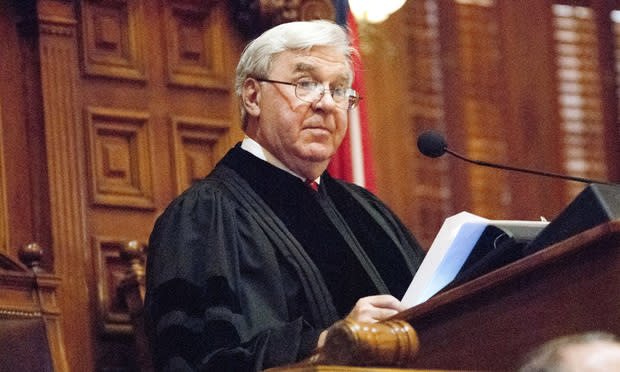'Wrongfully Convicted' Soldiers in Prison 25 Years Could Go Free Dec. 20
[caption id="attachment_4766" align="alignleft" width="620"]

Chief Justice P. Harris Hines, Georgia Supreme Court (Photo: John Disney/ ALM)[/caption] The three soldiers whose 25-year-old murder convictions the Georgia Supreme Court reversed in November have moved another step closer to freedom. They have a bond hearing scheduled for 10 a.m. Dec. 20 in Savannah. “It is our hope to free those men that day,” Jim McCloskey said Friday. McCloskey is the founder of Centurion, the Princeton-based defense organization that represents the soldiers. If the men go home, they will become the 59th, 60th and 61st to be freed since McCloskey started his work in 1980. “They are the most dramatically and obviously innocent of all of them,” he said. A spokeswoman for Chatham County District Attorney Meg Heap said Friday that prosecutors have not yet decided whether to oppose the bond or to retry the case: “Unfortunately, we are unable to answer either question, as they are tied to one another. We are still in the process of reviewing the original case file, which consists of 11 boxes of materials. Since the case was tried so long ago, it is taking some time for review.” Chief Justice P. Harris Hines wrote for a unanimous court Nov. 2 that prosecutors improperly withheld evidence from the defense that could have changed the outcome of the trial. Mark Jason Jones, Kenneth Eric Gardiner and Dominic Brian Lucci were 20 and 21 and just returned from duty in Iraq and Korea when they were arrested for a crime their lawyers said they knew nothing about and were nowhere near. They’re now in their mid-40s. The soldiers, who are white, were stationed at the Fort Stewart Army base near Savannah when they were found guilty in November 1992 of murdering Stanley Jackson, an African-American. Jackson was shot in the street with a high-powered assault rifle, possibly an AK-47, and left dead in an intersection. A witness identified two of the men as the shooters, hanging out the windows of their 1992 Chevrolet Cavalier firing rapidly, and said a third man was driving, according to the Hines opinion. That witness later recanted. All three were convicted of malice murder and possession of a firearm during the commission of a crime and sentenced to life in prison plus five years. In June 1994, the Supreme Court upheld their convictions, according to a summary provided by the court’s public information office. The case was heard on a habeas appeal. After an Open Records Act request in 2010, defense attorneys learned that the police had withheld evidence in the form of a document called the “Yamacraw Report.” That critical police report documented a similar racially-motivated incident on the same night as Jackson’s murder but after the three men were already in custody. According to that report, about three hours after the servicemen were arrested, white men with military-style haircuts and carrying semi-automatic weapons drove through the Yamacraw Village public housing project, threatening “to shoot blacks who hung out on street corners.” A citizen reported the incident to a police officer who wrote a report that made its way into the Stanley Jackson police case file. But the report was never disclosed to the defendants’ defense counsel and only came to light after the 2010 Open Records Act request. ‾Also, the defense counsel told the court, the eye witness had first told police he could not identify the shooters and was coerced into testifying differently. The defense attorneys include Steven Lee Sparger of Savannah and Peter Camiel of Camiel & Chaney in Seattle. On the night of the crime, all three soldiers were at a wedding rehearsal in Hinesville—about an hour from Savannah—until 9:30 p.m. the night of the 10 p.m. shooting, according to McCloskey and Camiel. Jones was to be married the next day. He wanted to go home, but his fiancée encouraged him to accept his friends’ invitation to go out for a bachelor party in Savannah. They had heard about a strip club but got lost trying to find it. McCloskey said the reason they were arrested is they stopped to ask a police officer for directions to the club. Later, someone said their car looked like the one used by the shooters. They were pulled out of the bar to which the officer had directed them and arrested at 11 p.m. Camiel said the police responded to another similar incident at 1 a.m., but the prosecutors kept it out of the trial. Camiel said that unlike many innocence project cases, this one had no DNA evidence to use to exonerate the clients. No weapon was ever found in the servicemen’s car. The soldiers have been moved from state prison to the Chatham County detention center. McCloskey said they have family and supporters coming from Texas and Ohio to attend the bond hearing in Chatham County Superior Court before Judge Timothy Walmsley.

